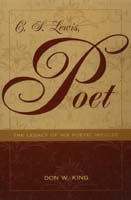C.S. Lewis, Poet

King, Don. C.S. Lewis, Poet: The Legacy of His Poetic Impulse. Kent, OH: Kent State University Press, 2001. ISBN 0-87338-681-7, tp, $28.00.

(This review originally appeared in Mythprint 38:10 (#235) in October 2001.)
Reviewed by Doris T. Myers
King’s stated intention is to produce a thorough, critical scholarly study of Lewis’s poetry. A second intention is to show how Lewis’s deep desire to be a poet and his intense labors toward that end lead to his “golden prose.” The result is an informative, useful, and readable book.
Five of the nine chapters focus on Lewis’s early life. The first chapter traces literary influences — Greek, Latin, Norse and English — on the young poet as found in his letters to Arthur Greeves, the published diary All My Road, and “The Lewis Papers,” Warren Lewis’s unpublished typescript covering the Lewis family from 1850-1930. The four additional chapters on the early poetry reveal Lewis as an angry young man frustrated by the “nightmarish horror” of the Great War. King usefully puts the early poetry in context by comparing it with that of other war poets such as Siegfried Sassoon. These chapters also assess Lewis’s poetic skill, especially as a writer of narrative poetry.
Three chapters are devoted to the topical poems that Lewis wrote after he had turned to prose as his major tool of self-expression. The chapters are “Comic and Satiric Verse,” “Contemplative Verse” (though “Philosophic Verse” might be a more exact title), and “Religious Verse.” Chapter Seven on “Contemplative Verse” is particularly interesting in that it shows Lewis to be a much more complex person than the cheery Christian apologist of Mere Christianity and The Problem of Pain. The same is true of “Religious Verse,” which, as King says, shows a Lewis “engaged in analysis” and “tentative, open ended, searching, questioning” (223).
The final chapter focuses on Lewis’s poetic prose in Perelandra and A Grief Observed. King deals with Perelandra by analyzing Ruth Pitter’s transcription of the Great Dance passage into Spenserian stanzas. Although the discussion is interesting, his argument that A Grief Observed is best read as free verse, divided into stanzas reminiscent of Tennyson’s In Memoriam, is probably of greater value to readers of Lewis. Some references to Lewis’s remarks on the poetic qualities of the Hebrew psalms in Reflections on the Psalms would have strengthened this chapter. He might also have emphasized more strongly the “open ended, searching, questioning” qualities of A Grief Observed, which might have been suitable named “A [False] God Opposed.”
An overall positive impression of the book is conveyed by some minor features. First, the size, shape, and binding of the book make it pleasant to handle. Second, the design of the title page emphasizes the word “poet” instead of the usual attempt to trade on Lewis’s name by making it the largest item on the page. Third, the end notes are keyed to page numbers, which facilitates skimming for the busy reader.
Six appendices plus a rather complex bibliography support the text. The appendices supply much of Lewis’s previously unpublished poetry, including the unfinished Wagnerian epic of the Ring discussed in Chapter Two and Ruth Pitter’s Spenserian stanzas. The bibliography has separate listings for “poems” (further subdivided), Lewis’s other works, and criticism of Lewis’s poetry. Both appendices and bibliography will be useful to Lewis scholars seeking to expand their understanding of Lewis’s life and thought. Comprehensive as it is, the book leaves room for further scholarly work. King accepts Walter Hooper’s editorial choices in Poems “for the purposes of this study” (170) without explaining the nature, background, and extent of scholarly doubts concerning these choices. Besides resolving questions of provenance and dating, it would be helpful to have critical arguments about which of the variant wordings are more effective as poetry. And as King himself points out, there is more work to do in looking at the poetic qualities of Lewis’s other writing.
In summary, although C.S. Lewis, Poet is not the last word about its subject, it is a credit to the author and to Lewis scholarship in general.